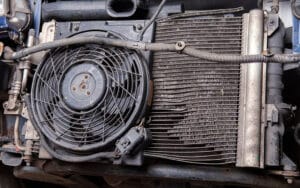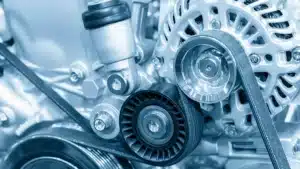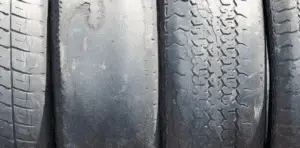Fixing Squeaky Brakes

The figure of Fixing Squeaky Brakes
Fixing Squeaky Brakes: One of the first things you should do if you have noisy brakes is to try to determine what is causing the noise. You should be aware that all brakes occasionally generate noise. That the odd squeak is not a concern, and that a noisy brake can stop a car just as a silent one.
The majority of contemporary brakes feature a cast-iron disc wedged between two friction-material-lined brake pads. The average commuter will use large steel discs. But some more expensive vehicles use pricy carbon-ceramic discs or even unique tungsten carbide coatings on the disc.
The disc, the pads, and the caliper they are installed in can begin to vibrate under the correct circumstances, exactly the same way a violin string vibrates when the instrument’s bow strokes it. The majority of brake squeals have one distinct frequency. The left pedal’s resistance and the vehicle’s speed only affect the noise’s volume. The pad and disc’s mass and rigidity determine the noise’s pitch.
A Saturday mechanic can typically fix brake systems that are noisy because of poor manufacturer development without having to completely reengineer the system.
Fixing Squeaky Brakes: Normal Brake Pad Noises

For the first few stops in the morning, many brake pads will make a swishing or grinding sound as they warm up and release any moisture that has accumulated over night. It’s common for the pads to be hissing or grinding on some rainy or foggy mornings as they remove a tiny layer of rust that has built up on the iron discs.
There may also be some noise from the brake pad compound itself. In the past, asbestos was widely present in the friction substance used in brake pads. The industry has almost entirely transitioned to less hazardous alternatives because asbestos was also extremely carcinogenic to individuals who worked with it. One material that is often used but has a tendency to be dusty is kevlar.
Because of escalating safety regulations and a plethora of additional features that customers want, today’s cars are heavier than ever. Metallics and ceramics have become more popular as friction materials for brake pads as a result of the necessity to slow down larger cars. Unfortunately, as you slow down. These can cause brakes to hiss or even begin to grind. The cost of improved performance is negligible.
So all pad noise is acceptable, correct? Not quite. You must immediately pay attention to one brake sounds.
When a brake pad reaches its wear limit. A little spring steel finger known as a wear indicator will scrape against the disc. Before the friction material wears entirely away. This sound signals that it’s time to switch out the worn-out pads for new, thicker ones. If you let it go for too long, your metal brake rotors can become damaged when you attempt to grasp them with the backing plates of your pads. Which aren’t particularly gripping. Don’t dismiss this as just another brake screech.
Fixing Squeaky Brakes: Stop the Squeak

Let’s get started and stop making noise with our brakes. Simply switching out the friction substance is one solution. When deciding which brake pads to use on your car. Manufacturers weigh a number of factors, including pad life, noise, grip, dust generation, and pricing. The tune of the pad and disc can be changed by switching to an aftermarket metallic or ceramic pad. Which alters the resonant frequency of the pad and disc. Numerous aftermarket pads are created particularly to have particular desirable qualities, such low noise or low dust.
You might be able to disconnect the brake piston acoustically from the pad by purchasing Teflon shims if you still have plenty of pad material and don’t want to spend $50 to $100 on a new set. These slide in between the brake pad and the hydraulic piston of the brake caliper. These shims have had mixed results in my testing; they occasionally work and occasionally don’t.
We selected expensive ceramic brake pads in the hopes that the various friction properties would eliminate the screech. Surprise! Teflon-coated shims were already present when the fresh pads were taken out of the box.
Calipers
Some calipers, especially when using new, unworn pads, don’t have enough extra travel in the piston bore to allow any shimming without causing the brakes to drag. If this is the case, or if the shims just didn’t work, you can obtain a comparable acoustic decoupling by simply applying high-temperature brake grease or anti-seize compound to the back face of the pad backing plates. This adjustment won’t last as long as shims because water and road grime will ultimately wash it away.
Having said that, we wouldn’t advise using the straightforward aerosols that you spray into the friction substance of the pad. I have no idea if they genuinely stop the squeak because I won’t test anything that alters the pad’s friction properties. Don’t forget that the purpose of your brake system is to slow down your vehicle. Anything that could in any way lessen the efficiency of the system is a terrible idea.
Furthermore, your spray-on repair will also wear off over time because the brake pad and brake rotor are wear items whose surfaces gradually deteriorate.
Fixing Squeaky Brakes: A Sticky Solution
Our preferred fix for squeaks is based on a different idea: glue the brake pad’s backing plate to the piston or caliper housing, essentially increasing its mass, rather than using shims or lubricants to decouple the pad from the caliper. This shifts the system’s resonance frequency out of the squealing frequency range.
It won’t work to spread any Super Glue on it. You need something that can endure the corrosive elements that cars encounter on a daily basis, like heat, salt, and water. When do braking systems become hot? I’ve witnessed truck brake drums igniting with flames as they descended Donner Pass, as well as brake discs blazing brilliant orange at the foot of Pikes Peak. After a few heated laps, the brakes on my own race car start to visibly glow.
Toothpaste- or lipstick
Fixing Squeaky Brakes: Over the years, I’ve tried a variety of treatments for this, but they are all essentially anaerobic adhesives that are applied as either a toothpaste- or lipstick-like goo. The use of this product is straightforward: Alternatively, use new pads and remove and clean the old ones. The area where the brake pad backing plate contacts the piston and caliper should be cleaned.
Make sure to clean any road grime or corrosion off the mating parts before installing any braking components. For the brake pad and piston to function correctly. Especially as your pads and rotors deteriorate, they must be allowed to slip in and out. To clean up any sliding parts. You may require brake cleaner, a wire brush, or a file. But you must be able to ensure that nothing will clog your caliper and make it drag. Try forcing the piston back into the caliper with a C-clamp and an old brake pad or a tiny piece of wood sandwiched between the clamp and the piston if you can’t do it with your own hands.
While you’re in there, put a thin layer of high-temperature brake grease on any moving surfaces because well-lubricated parts are significantly quieter. Before you replace your wheels, take care not to get any greasy handprints on the disc surface or get anti-seize or grease on the pad or disc.
FAQ
How can I stop the squeaking in my brakes?
Installing a set of shims will help to reduce vibrations, which should stop any squealing noise. Shims often employ a layer of rubber to dampen vibrations and ensure that brake pads are tightly connected to the brake calipers.
Can I use a spray to make my brakes stop squeaking?
By attenuating vibration at the caliper/brake pad interface, Permatex Disc Brake Quiet eliminates brake screaming. It prevents corrosion while ensuring a tighter fit and making disassembly simpler.
Is it pricey to mend brakes that squeak?
What is the cost to fix squeaky brakes? As soon as your car’s brakes start to squeak, take it to a mechanic. Based on labor costs, you can pay anywhere from $80 and $115 for a general examination. Depending on the make and model of your car. Installing a new set of brake pads might cost close to $300 for components and labor for each axle.
I have nice brake pads, so why do my brakes squeak?
Your brakes can easily develop a thin film of rust on the rotors if moisture gets inside of them. When you press the brakes. This may result in a grinding or screaming sound. Fortunately, everyday driving may usually remove the rust accumulation.
Read more:
Uneven tire wear patterns: what causes them?







